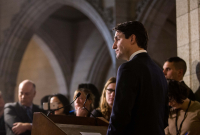Support strong Canadian climate journalism for 2025
A report by British Columbia's seniors advocate says the province ranks last in Canada in providing key financial support to elders, with 84 per cent of its low-income seniors sometimes running out of money to buy food.
B.C. provides the lowest number of supports and services for seniors in nine areas, said Isobel Mackenzie, whose review makes 10 recommendations.
"When you look at this overall picture, you have to acknowledge that B.C. seniors are not getting the same level of financial support and subsidy for things they need as seniors are in other provinces and territories," she said Thursday at a news conference.
"When we looked at this across the territories and provinces, B.C. was the lowest," Mackenzie said.
The report ranked provinces and territories according to their provision of a range of health and financial support. They included home care, eye exams, eyeglasses, dental care, hearing aids, monthly financial supplements exceeding $100, home repairs, home adaptation, and rental subsidies with income limits exceeding $31,000.
B.C. provided two out of the nine supports — eye exams and home adaptation — while Alberta and Ontario covered seven and Yukon topped the list by offering support in all nine categories, Mackenzie said.
Mackenzie recommended that B.C. index its monthly seniors supplement to inflation and redesign the Shelter Aid for Elderly Renters program to reflect the realities of rising rents.
The government should also provide annual bus passes and other transportation services for seniors with accessibility issues, she said.
Housing Minister Murray Rankin did not address B.C.'s ranking in the report, but said in a statement the government had increased housing for seniors since first being elected in 2017.
"Seniors deserve safe, affordable, dignified housing," he said. "To better support the housing and support needs of low-income seniors we have increased the number of subsidized homes available, with more than 28,000 new homes completed or underway since 2017."
Seniors are eligible for most of these new units, some of which are specially designed for older people, he said.
The health ministry said in a separate statement that the province has provided about $2 billion since 2017 to improve care for seniors, including spending on primary care, home health, long-term care, assisted living and respite services.
"Despite the historic investments the government has made in senior care this report shows there is more that needs to be done to make life more affordable for seniors," it said.
"We acknowledge that and will continue making investments that improve the quality of life for seniors in British Columbia, providing them with the quality health care they deserve."
The Opposition Liberals said the government must take the report seriously and make changes to ensure seniors get the care and support they need.
"Seniors deserve to age with dignity, but the unfortunate reality is that they are falling through the cracks," Liberal seniors services critic Shirley Bond said in a statement.
"The overlapping crises of the past few years — affordability, housing, health care, and the pandemic — all disproportionately impacted seniors, and yet this government has failed to take any significant action to ensure that older British Columbians are properly supported."
Mackenzie said the review involved a provincewide survey of 10,000 low-income seniors and consultation with more than 80 community agencies working with older people.
The review highlighted the financial challenges seniors on government pensions are facing during times of rising costs.
Mackenzie said many seniors do not have private benefits plans and must pay the costs of dental care, hearing aids, eyeglasses, walkers, wheelchairs and other medical equipment not funded by the province.
"The 2019 median income for B.C. seniors was $30,750. What that means is that half of B.C.'s seniors are living on less than $30,750 a year and that is less than minimum wage," said Mackenzie.
The review said 25 per cent of B.C. seniors earn less than $21,000 annually. The average annual working-age income in B.C. is $51,170.
Mackenzie said the Shelter Aid for Elderly Renters program, which is designed to limit seniors' rent to 30 per cent of their monthly income, is failing.
SAFER program recipients in Vancouver now spend more than 60 per cent of their income on rent and 80 per cent of the people participating in the program have incomes of less than $25,000 a year, she said.
Rankin's statement acknowledged the challenges that higher rents are causing seniors despite increased payments under the SAFER program.
He said BC Housing is "currently reviewing the SAFER program, and recommendations on how we can better support seniors with housing costs are expected in the coming months."
The review found there has been a 78 per cent increase in the use of food banks by B.C. seniors over the last five year, Mackenzie said.
It also found half of all low-income seniors worried about being able to stay in their own homes as they aged, she said, while more than four in five sometimes ran out of money for food.
This report by The Canadian Press was first published Sept. 22, 2022.




Comments